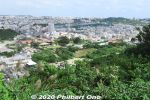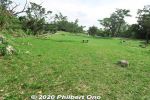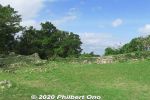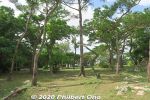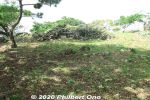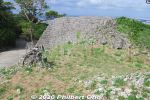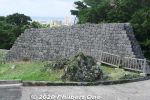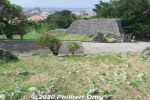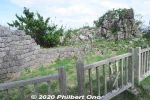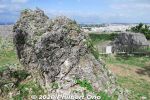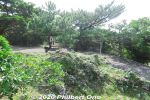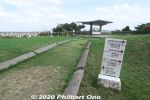 Image search results - "urasoe" Image search results - "urasoe" |
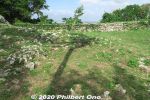
Urasoe Castle (浦添城) was originally built in the 12th century and served as the headquarters of the Chuzan Kingdom, one of the three kingdoms on the main island until they were unified to form the Ryukyu Kingdom in 1429. Only a few stone walls and craggy rocks remain, no buildings. It is also famous as Hacksaw Ridge featured in the acclaimed 2016 movie, "Hacksaw Ridge" directed by Mel Gibson.
|
|
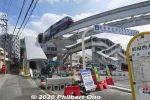
Urasoe Castle (浦添城) is on a low hill near Urasoe-Maeda Station on Yui Rail.
|
|
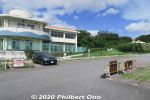
Short walk from the station, but you need to know where to turn right and go up this slope. It's not clearly marked from the road.
|
|
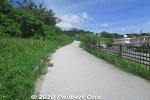
Sloping path up to Urasoe Castle site. This south side of the hill is a gradual slope, unlike the sudden and steep cliff on the north face.
|
|
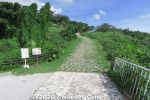
Historic cobblestone path part of the way up. Excavated in 2006.
|
|
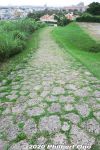
Cobblestone path restored from the 16th century when it was made as a path to Shuri Castle.
|
|
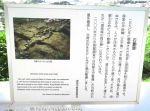
About the cobblestone or stone-paved path. Built by King Sho-nei in 1597 as an improved path from Urasoe Castle to Shuri Castle
|
|
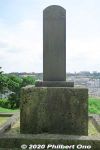
Replicated stone monument to mark the completion of the stone-paved path from Urasoe Castle to Shuri Castle in 1597. Original monument was destroyed during the World War II.
|
|

About the stone monument to mark the completion of the stone-paved path from Urasoe Castle to Shuri Castle.
|
|
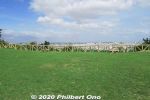
Urasoe Castle is the site of Hacksaw Ridge, made famous by the recent movie.Hacksaw Ridge was a WWII battle site where the Japanese army fought off US troops encroaching from below the cliff. The Americans named it "Hacksaw Ridge." It was part of the defense of Shuri Castle where the Japanese Army was headquartered.
|
|
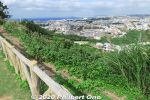
Hacksaw Ridge has thick vegetation growing on the cliffside, so we cannot see the hacksaw shape. The Japanese name translates as "Maeda Escarpment" (前田高地). This is a National Historic Site.
|
|
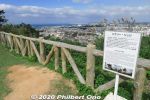
Urasoe Castle/Hacksaw Ridge is now a scenic point looking toward Ginowan and Futenma Marine Air Base.The blue ocean and bay in the distance toward the right looks beautiful and peaceful now, but on April 1, 1945, it was filled with US warships and landing craft when US forces first landed on Okinawa's main island to start the horrible and bloody three-month Battle of Okinawa.
|
|
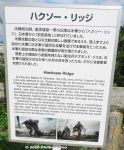
Hacksaw Ridge was made famous by the 2016 acclaimed movie, "Hacksaw Ridge" directed by Mel Gibson. Great story, great acting, great cinematography and special effects, memorable scenes and script, and very touching.If you don't like blood and gore, you might want to avoid watching it. The beautiful battle scenes were in the style of "Saving Private Ryan" with stereo sound of the whizzing bullets and explosions.
|
|

US Forces landed almost unopposed on the beaches of Chatan and Yomitan, mostly flat terrain. They came from the nearby Kerama Islands which they had captured in late March 1945.
|
|
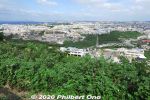
Based on a true story, the movie is about combat medic Desmond Doss (1919–2006) who was on Hacksaw Ridge with many killed and wounded. Instead of evacuating the top of the ridge, he remained and rescued 75 wounded soldiers during the night without being detected by the Japanese. He dragged them one by one and lowered each man on a rope down the cliff to other soldiers at the bottom who transported the wounded to base camp.
|
|
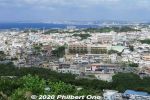
Not only that, he was a "conscientious objector" and refused to carry a gun and kill the enemy since it was against his religious beliefs. He was in the war with no gun. He was a medic, so he didn't think he needed a gun. He was awarded the Medal of Honor by President Truman.
Surprisingly, the movie was not an American or Japanese production. It was Australian. Most of the actors were Australian and it was filmed in Australia. Too bad no filming in Okinawa.
|
|
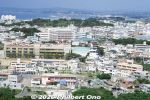
Below the ocean, the slither of green is a low hill called Kakazu Ridge (嘉数高地). After landing on Chatan and Yomitan unopposed on April 1, 1945, US forces had a relatively easy time advancing south toward Shuri Castle until they got to Kakazu Ridgeabout a week later. And then here at Hacksaw Ridge which was also fortified. Bloody fighting ensued for about 3 weeks. Both ridges are now peaceful parks.
|
|
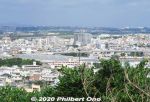
In the distance, the runway at Futenma Air Base as seen from Hacksaw Ridge. This is the air base slated to move to another location where it is less populated..
|
|
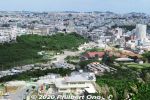
The movie also had Japanese actors, but all they do is shoot or die, including one "hari-kari" scene (actually spelled harakiri, but correctly called "seppuku"). We see them often, but no real Japanese dialog. The Japanese actors are credited anonymously in the end such as "Corpse With Rats" (three of them, and very realistic).
|
|
|

Jet fighters flying near Futenma Air Base as seen from Hacksaw Ridge. Very common scene above Okinawa's skies.
|
|
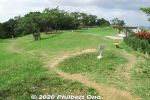
Top of Hacksaw Ridge. Hard to imagine this was once a bloody battle site.This is the top of the castle site. Only a few stone walls remain, no buildings.
|
|
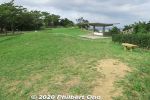
Urasoe Castle and Hacksaw Ridge is a peaceful place. The hill extends for about 400 meters in length.
|
|
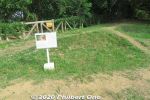
On Hacksaw Ridge, the purported location of Urasoe Castle's Seiden main building where building foundations were found during excavations in 1998. 正殿跡
|
|

Sign marking the location of Urasoe Castle's Seiden main building with a top view of the excavation showing building foundations and pillar holes. 正殿跡
|
|
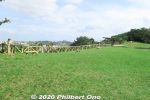
From Urasoe Castle, there's no trail going down the Hacksaw Ridge cliff.
|
|
|
|
|
|
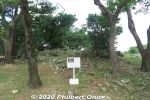
Probable location of the Urasoe Clan's castle residence (startng with Prince Sho-iko). Site was excavated in 1983 which found stone foundations and Chinese roof tiles here.
|
|

Sign indicating the probable location of the Urasoe Clan's castle residence.
|
|
|
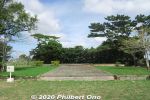
Former site of the Aikoku Chiso Memorial Monument erected here in 1965 in memory of people from Aichi Prefecture who died during the Battle of Okinawa. In 1994, the monument was moved to the Peace Memorial Park in Itoman.
|
|

About the former site of the Aikoku Chiso Memorial Monument.
|
|
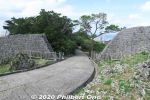
Modern-looking castle walls.
|
|
|
|
|
|
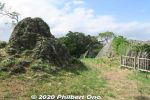
Lots of craggy rocks on Hacksaw Ridge.
|
|
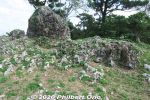
There is still much evidence that this was a coral outcrop.
|
|
|
|
|
|
|
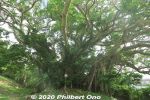
Chinese banyan or gajumaru tree (ガジュマル) at Urasoe Castle site. It's a good tree for shade.
|
|
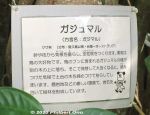
About the Chinese banyan or gajumaru tree (ガジュマル) at Urasoe Castle site.
|
|
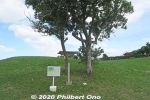
Location of the "tun" place of prayer rituals at Urasoe Castle conducted by a noro priestess and villagers from Nakama and Maeda.
|
|
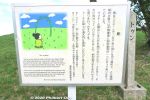
The tun was created with a pair of bamboo connected at the top to form an arch as a gate for the gods. Prayers for a rich harvest were held here.
|
|
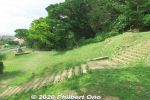
Going back down.
|
|
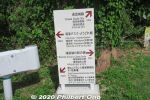
Another noted site is the Urasoe Gusuku and Yodore which is the royal mausoleum for Ryukyu Kings.
|
|
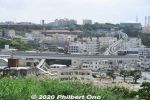
View of Yu Rail from Urasoe Castle.
|
|
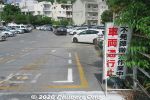
On the way back to the station, noticed this sign saying "Road closed, removing dud bomb." That's how often often they find dud bombs from World War II.
|
|
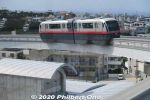
Yui Rail train near Urasoe-Maeda Station.
|
|
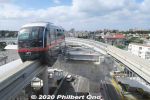
Yui Rail train arriving Urasoe-Maeda Station.
|
|
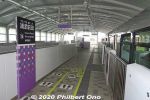
Yui Rail Urasoe-Maeda Station.
|
|
|
|
|


















